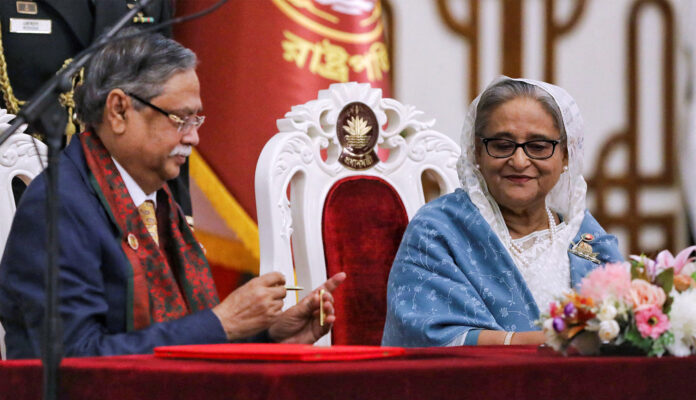Massive protests have broken out in the Bangladeshi capital following President Mohammed Shahabuddin’s recent controversial remarks about former Prime Minister Sheikh Hasina’s departure from power. Shahabuddin’s claim that he had unsuccessfully attempted to collect Hasina’s resignation letter has sparked widespread debate and led to accusations of military involvement in her ouster.
Hundreds of protesters took to the streets in Dhaka, attempting to storm the presidential palace, Bangabhaban, demanding the president’s resignation. The protests were quickly met with resistance by the army, which set up barricades to prevent the demonstrators from reaching the palace. Protesters have accused Shahabuddin of violating his oath of office by allegedly misrepresenting the circumstances surrounding Hasina’s departure, while opposition leaders have intensified calls for transparency.
Shahabuddin’s comments, made in an interview with the Bangla daily Manab Zamin, ignited the controversy. He stated that despite multiple efforts, he was unable to obtain Hasina’s resignation letter. “I tried [to collect the resignation letter] many times but failed. Maybe she did not get the time,” Shahabuddin was quoted as saying. This contradicts his earlier claim in an August 5 televised address, when he announced that Hasina had resigned and he had received her letter.
The apparent contradiction has fueled speculation that Hasina, who fled to India on August 5 amid mass protests, may have been forced to leave the country without officially resigning. Bangladeshi writer and activist Taslima Nasrin strongly criticized both the president and the military, alleging a coordinated effort to remove Hasina from power without proper documentation of her resignation. “Everybody in Bangladesh lied,” Nasrin tweeted. “Resignation letter is like a god, everybody says it is there, but nobody can show or prove it.”
Adding to the uproar, Indian strategic analyst Brahma Chellaney echoed claims of a forced exile, suggesting the military had pushed Hasina out of office, leading to the current interim government led by economist Muhammad Yunus. Chellaney referred to Shahabuddin’s remarks as evidence of an “usurper regime” and hinted at internal conflict within the interim administration, as advisers now question Shahabuddin’s capacity to continue as president.
As tensions escalate, protesters have vowed to continue their demonstrations, calling for the resignation of both President Shahabuddin and Army Chief General Waker uz Zaman, who has also been implicated in the controversy. The political crisis shows no signs of abating, and the situation remains tense as the nation awaits further developments.



